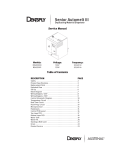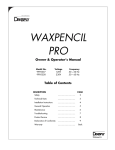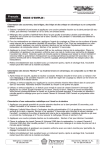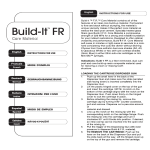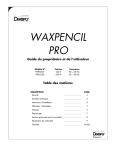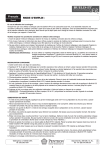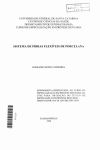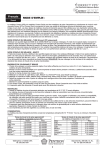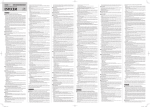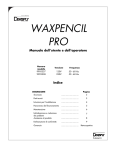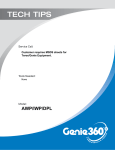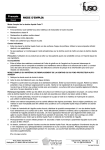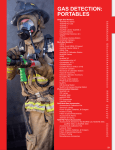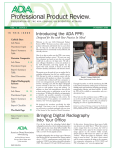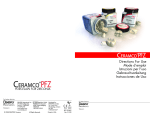Download Sculpture® Plus™ Composite
Transcript
For Beautiful Indirect Metal-Free Restorations Instructions Sculpture Plus™ Composites - The New Standard for Indirect Metal - Free Restorations ® + Indications • Metal-free anterior/posterior crowns • Metal-free anterior and posterior bridges with FibreKor® frameworks • Cosmetic inlays, onlays and veneers • Bonded retainers i.e. "Maryland type" bridges • Metal-free anterior and posterior restorations with FibreKor posts + Contraindications • Metal-free bridges with an individual proximal span of over 15 mm • Patients with known sensitivity to ingredients in Sculpture Plus material • Screw retained implant substructures without custom cast metal abutment Physical Properties Chart Flexural Strength 140 MPa Flexural Modulus 13.3 GPa Water Sorption Solubility Depth of Cure (mm) In vivo Projected Wear Rate Generalized Surface Wear 15.1 µg/mm3 3.1 µg /mm3 >2 mm <1.5 µ/ yr 3.8 µm Table of Contents An Introduction to Sculpture Plus Composites ..................................................2 The Sculpture® Curing Light ..............................................................................3 Composite Basic Handling Technique ................................................................4 Basic Die/Model Preparation ..............................................................................5 Build-up Techniques Crown ................................................................................................................6 Inlay ..................................................................................................................9 Polishing Technique............................................................................................11 Glazing Technique ..............................................................................................12 Metal-Free Layering Technique ........................................................................13 Body/Incisal Co-ordination Guide ......................................................................13 1 7 1 7 We s t C o l l i n s Av e . , • O r a n g e , C A 9 2 8 6 7 800.243.3100 • 203.303.2010 CEpartner4U, Esdoorniaan 13, 3951DB Maarn. • The Netherlands. • tel: +31 (0)6.516.536.26 Sculpture Plus™ Composite - The First Indirect Nano - Hybrid Restoration System ® Welcome to the new age of metal-free restorative dental composites. Pentron Clinical has taken our clinically proven, high performance Sculpture® composites and reformulated them to minimize delamination and deliver unsurpassed esthetics. The nano-hybrid composition of Sculpture Plus composites achieves exceptional polishability while maintaining the high strength and low water sorption of our original Sculpture product. The resin developed for Sculpture Plus composites retains our patented polycarbonate dimethacrylate (PCDMA) in a modified form. This proprietary resin formulation provides superior chip, stain and wear resistance. Our unique silanated nano-hybrid filler component delivers reinforced margins and long-lasting luster for strong and beautiful restorations. The Sculpture Plus Kit provides you with all of the necessary materials and instruments to make successful and profitable Sculpture Plus restorations. The kit now includes silicone tipped instruments that are ideal for contouring and detailing your Sculpture Plus restorations. For Sculpture Plus restorations of the highest quality, Pentron Clinical has developed the Sculpture Curing Light. Through extensive research, Pentron has confirmed that pressurizing composite prior to and during polymerization improves the strength and esthetics of final restorations. The Sculpture Curing Light is one of the first cure lights to incorporate pressure and visible light into a single, easy to use unit. 2 Using the Sculpture Curing Light ® Pentron Clinical introduces the Sculpture Curing Light to provide maximum functionality and improved esthetics for your Sculpture Plus restorations. The Sculpture Curing Light provides two standard cure cycles that are pre-programmed for ideal results with Sculpture Plus composites. The Buildup and Final cure cycles both run automatically with no manual operations other than the press of a button. A set-up tray is provided with the Sculpture Curing Light to properly support and orient your Sculpture Plus restorations during cure. Build-up Cure Cycle The Build-up cure cycle is recommended with each 1 mm application of Sculpture Plus composite for maximum polymerization. The pre-set cycle consists of a 5 minute pressure only segment followed by a 3 minute pressure and light segment. Pressurizing prior to and during light cure ensures enhanced bonding between layers and removes flaws or voids in the material before they are incorporated into the restoration during cure. Final Cure Cycle The Final cure cycle follows the same cycle as the Build-up cure, but first purges the cure chamber of oxygen using nitrogen to produce a hard outer surface ideal for polishing. This cure cycle is required after the application of the final incisal layer and is also used if Sculpture Plus LP Glaze is applied after mechanical polishing. 3 Composite Basic Handling General Storage and Handling • If refrigerated, bring material to room temperature prior to use. • For maximum polymerization, cure in the Sculpture Curing Light Build-up cycle after each 1 mm application of Sculpture Plus composite. Cure the final layer of Sculpture Plus incisal material in the Final cure cycle. • Cover any dispensed material with the light blocking cover to protect the composite between uses and to prevent premature polymerization from ambient light. Basic Handling Technique 1. Dispense and cut desired amount of Sculpture Plus composite. (Fig. 1) 2. Flatten material with metal spatula to soften and bring to workable temperature. Avoid folding or incorporating air into the material. (Fig. 2) Fig. 1 3. Shape and flatten Sculpture Plus composite into a disc with a maximum thickness of 1mm for ideal handling during build-up. 4. Allow material to sit for 5-10 seconds to develop a shiny appearance. The shiny surface improves workability and bonding between layers. Fig. 2 5. Cut small, thin sections of prepared Sculpture Plus material for application to dies and/or models for ideal handling and esthetics. (Fig. 3) Fig. 3 4 Basic Die/Model Preparation 1. Using diestone material, pour the impression and prepare the model/die in the usual manner. 2. Optional Step – Re-pour impression using diestone material without pins for a "solid model” technique. Fig. 1 3. Inspect die and blockout any undercut. Note: All die blockout should be accomplished with high temp inlay-wax or polymer blockout material prior to sealing the die. 4. Mark and define the margins with a permanent marking pencil. (Fig. 1) Fig. 2 5. Protect and seal the margins by applying a thin coat of Zip Sep*™ Sealer. Apply a second coat within 15 seconds. Allow to dry for 2 minutes. (Fig. 2) 6. Paint a thin coat of Sculpture Plus Die Spacer all over the die, including margins. Allow to dry for 5 minutes. For a more passive fit, a second or third coat should be applied. Keep any additional coats 1mm away from the margin. Sculpture Plus Die Spacer also acts as a separator. (Fig. 3) Fig. 3 7. Use Zip Sep*™ Sealer to seal contact areas, opposing models and saddle areas. (Fig. 4) Note: Use Zip Sep*™ Sealer and Zip Sep*™ Universal Separator when adding to short, incomplete margins on the die. * Zip Sep™ is a trademark of Dental Ventures of America, Inc. Fig. 4 5 Single Crown Build- up Technique Please provide the Sculpture Plus Preparation Guides to your dentist and review prior to operative procedures. For best results, build Sculpture Plus restorations to contour and avoid over building material. Sculpture Plus composites do not shrink significantly upon cure. 1. Prepare die/model per preparation instructions on Page 5. 2. Dispense and prepare desired shades and amounts of Sculpture Plus materials per basic handling technique on Page 4. 3. Cut a thin section of prepared Sculpture Plus Body material and apply it to the prepared die. (Fig. 1) Fig. 1 4. Adapt by burnishing the material from the center to the periphery. (Fig. 2) 5. Remove any excess material from the margin. (Fig. 3) Fig. 2 6. If desired, apply a small amount of Sculpture Plus Neck Paste and/or Opaceous Body to the cervical area to achieve a more natural look. (Fig. 4) Fig. 3 Fig. 4 6 Single Crown Build- up Technique Fig. 5 7. Adapt Neck Paste and/or Opaceous Body to cervical area. Do not overextend margins. (Fig. 5) 8. Cure in the Sculpture Curing Light using the Build-up cure cycle. (Fig. 6) 9. Apply additional layers as needed (Fig. 7). Build to contour. Do not over-build. Note: For maximum cure, incremental cures with a build up of 1 mm of material between cures is recommended. 10. Contour, refine and shape the restoration during build-up using metal or silicone tipped instruments. (Fig. 8) Fig. 6 Note: Build-up steps 9 -13 may not be necessary depending on the requirements of the restoration. Fig. 7 Fig. 8 7 Single Crown Build- up Technique 11. Add any desired internal characterization to final body layer using Sculpture Plus Color Pastes. Example: To create a stained vertical check line, make a thin slice into uncured layer of Sculpture Plus material (Fig. 9) and apply a thin line of color paste as shown. (Fig. 10) Note: Color pastes are for adding characterization markings underneath an incisal layer only. Color paste may be added after application of the incisal layer if the incisal material is then manipulated to fully cover the color paste. Color pastes are not to be used as an external stain. 12. Use instruments to push Sculpture Plus Body material next to characterization marking, being careful not to cover them with body material. Fig. 9 Fig. 10 13. Cure with the Sculpture Curing Light using the Build-up cure cycle. 14. Add the appropriate shade of Sculpture Plus Incisal material per recommended layering technique on Page 13 (Fig. 11). Build to contour. Do not over-build. Fig. 11 15. Cure incisal layer with the Sculpture Curing Light using the Final cure cycle. (Fig. 12) 16. Build-up is complete. 17. Polish restoration per technique described on Page 11. Fig. 12 8 Inlay Build- up Technique Please provide the Sculpture Plus Preparation Guides to your dentist and review prior to operative procedures. For best results, build Sculpture Plus restorations to contour and avoid over building material. Sculpture Plus composites do not shrink significantly upon cure. Note: Use similar technique for onlay and veneer restorations. 1. Prepare die/model per preparation instructions on Page 5. 2. Dispense and prepare desired shades and amounts of Sculpture Plus materials per basic handling technique on Page 4. Fig. 1 3. Cut a thin section of prepared Sculpture Plus Range Modifier or Body material and adapt to the preparation floor using appropriate instruments. (Fig. 1) 4. Apply Sculpture Plus Body material to the inlay preparation. (Fig. 2) 5. Adapt the material carefully. Body material should not extend to the margins. (Fig. 3) Fig. 2 Fig. 3 6. Cure in the Sculpture Curing Light using the Build-up cycle. (Fig. 4) Fig. 4 9 Inlay Build- up Technique 7. Apply additional layers as needed. Build to contour. Do not over-build. Note: For maximum cure and polymerization, incremental cures with a build up of 1 mm of material between cures is recommended. 8. Add any desired internal characterization using Sculpture Plus Color Pastes. Example: Place brown color paste in central grooves as shown. (Fig. 5) Note: Color pastes are for adding characterization markings underneath an incisal layer. Color paste may be added after application of the incisal layer if the incisal material is then manipulated to fully cover the color paste. Color pastes are not to be used as an external stain. Fig. 5 Fig. 6 9. Apply Sculpture Plus Incisal material to the marginal and triangular ridges. Use a more translucent incisal to blend with the adjacent natural tooth structure. (Fig. 6) 10. Contour, refine and shape the restoration using metal or silicone tipped instruments. Fig. 7 11. Cure incisal layer in the Sculpture Curing Light using the Final cure cycle. (Fig. 7) 12. Build-up is complete. (Fig. 8) 13. Polish restoration per technique described on Page 11. Fig. 8 10 Polishing Technique 1. Add any additional contour using various grits of abrasives. (Fig. 1) 2. Add final surface texture, as necessary, using rubber wheels or points. (Fig. 2) Fig. 1 3. Use Upofix*® brushes to provide polish and shine without altering the established texture. Upofix*® brushes are effective for polishing all Sculpture Plus surfaces, including occlusal surfaces. (Fig. 3) 4. For final, high luster polish, apply Sculpture Glo® with a cotton buff wheel at medium RPM and pressure. (Fig. 4) Fig. 2 5. Optional Step: Sandblast internal aspect with 50µ aluminum oxide at 25-30 psi. 6. Optional Step: Glaze with Sculpture Plus LP Glaze, if desired, per the glazing technique on Page 12. 7. Submerge restoration in distilled water to clean. Do not submerge Sculpture Plus restorations in alcohol at any time. Fig. 3 Fig. 4 8. Restoration is ready for delivery. (Fig. 5) Fig. 5 * Upofix® is a registered trademark of Austenal, Inc. 11 Optional Glazing Technique 1. Apply a thin layer of Sculpture Plus LP glaze to fully contoured and polished restoration. (Fig. 1) Note: For best results, apply Sculpture Plus LP Glaze directly onto a clean brush, then to your work. Replace the lid immediately. 2. Cure in the Sculpture Curing Light using the Final cure cycle. Fig. 1 3. Restoration is ready for delivery. Add - Ons and Repairs Indirect Technique: 1. Adjust the surface requiring repair or additional material using various grits and abrasives. 2. Surface clean with steamer or isopropyl alcohol (99%). If using an ultrasonic cleaner, do not submerge Sculpture Plus restorations in alcohol. 3. Air dry restoration. 4. Apply a thin layer of Sculpture Plus Thinning Liquid and cure with visible light in the Sculpture Curing Light for 1-2 minutes. Note: For a 1-2 minute light cure with the Sculpture Curing Light, select the Build-up Cure Cycle then press the "Minutes Down" key until the time display for "Pressure" reads "0 00." Press the “Select” key and set the desired cure time for "Pressure & Light". Refer to the Sculpture Curing Light User’s Manual for full instructions. 5. Add Sculpture Plus material as needed using standard build-up technique. 6. Contour, cure and polish per standard technique. Direct Chairside Technique 1. Air abrade the surface requiring material addition. 2. Clean with isopropyl alcohol (99%). 3. Air dry restoration. 4. Apply Bond-1® or equivalent bonding agent. Remove solvent. 5. Add Simile® nano-hybrid direct composite, or equivalent, as necessary for repair and light cure per manufacturer’s instructions. 6. Adjust, finish and polish using standard composite finishing technique. * Bond-1® and Simile® are registered trademarks of Pentron Clinical 12 Metal-Free Composite Layering Technique Standard Technique Incisal Modified Technique Body Transparent Incisal* Neck Paste Opaceous Body * The addition of transparent incisal creates a “halo” effect at the incisal edge. Body/Incisal Coordination Guide Body Incisal Body Incisal Body Incisal Body Incisal A0 A1 A2 A3 A3.5 A4 1-7 1-8 1-8 1-9 1-9 1-10 B0 B1 B2 B3 B4 I-7 I-8 I-8 I-9 I-9 C1 C2 C3 C4 I-8 I-9 I-9 I-10 D2 D3 D4 I-9 I-10 I-9 Sculpture® Plus™ Transparent Incisal (I -T) may be used for every shade All Sculpture Plus composite shades can be used as modifiers and may be combined in a variety of ways to achieve desired results. 13 06J102-Rev 02-Z90M 1717 West Collins Ave., Orange, CA 92867 • Tel: 800.243.3100 / 203.303.2010 • www.pentron.com CEpartner4U, Esdoorniaan 13, 3951DB Maarn. NL. tel: +31 (0)6.516.536.26

















